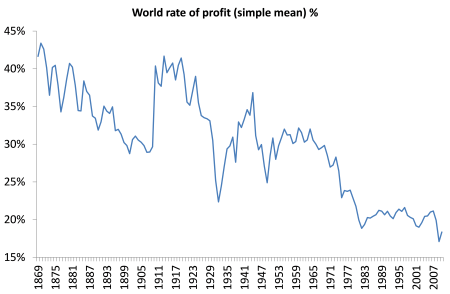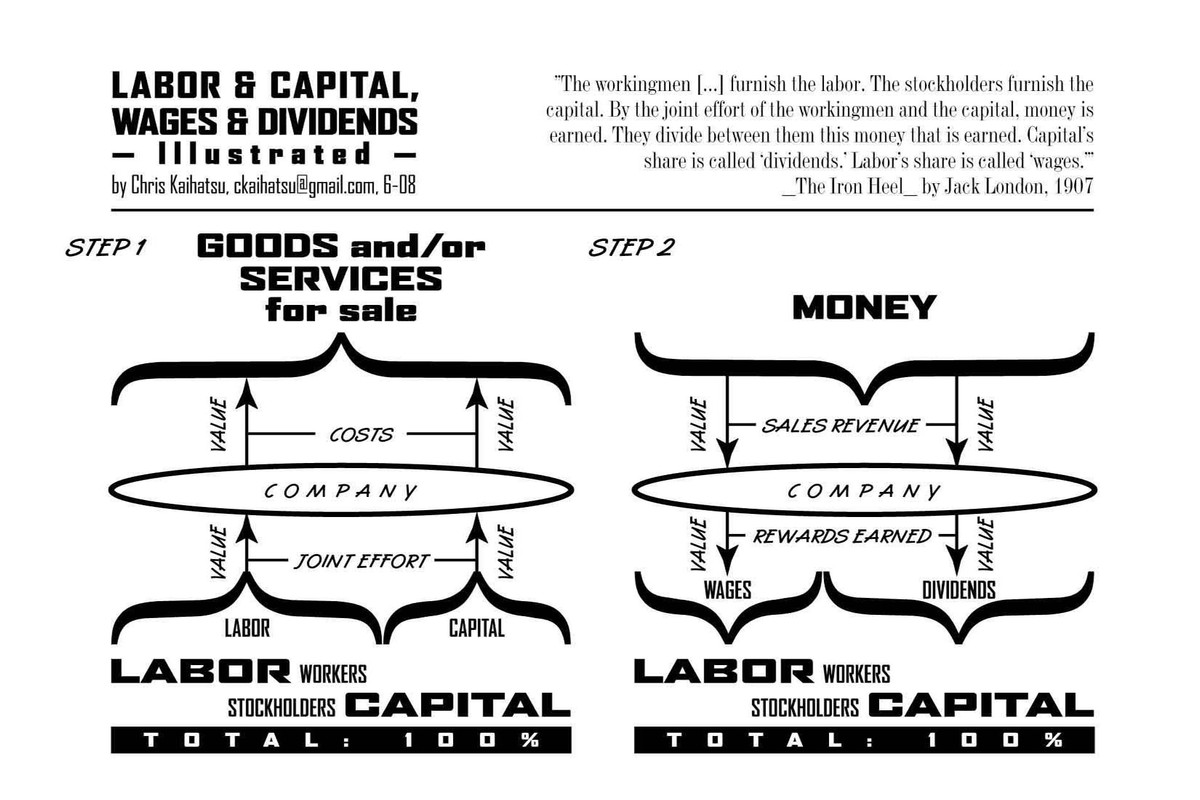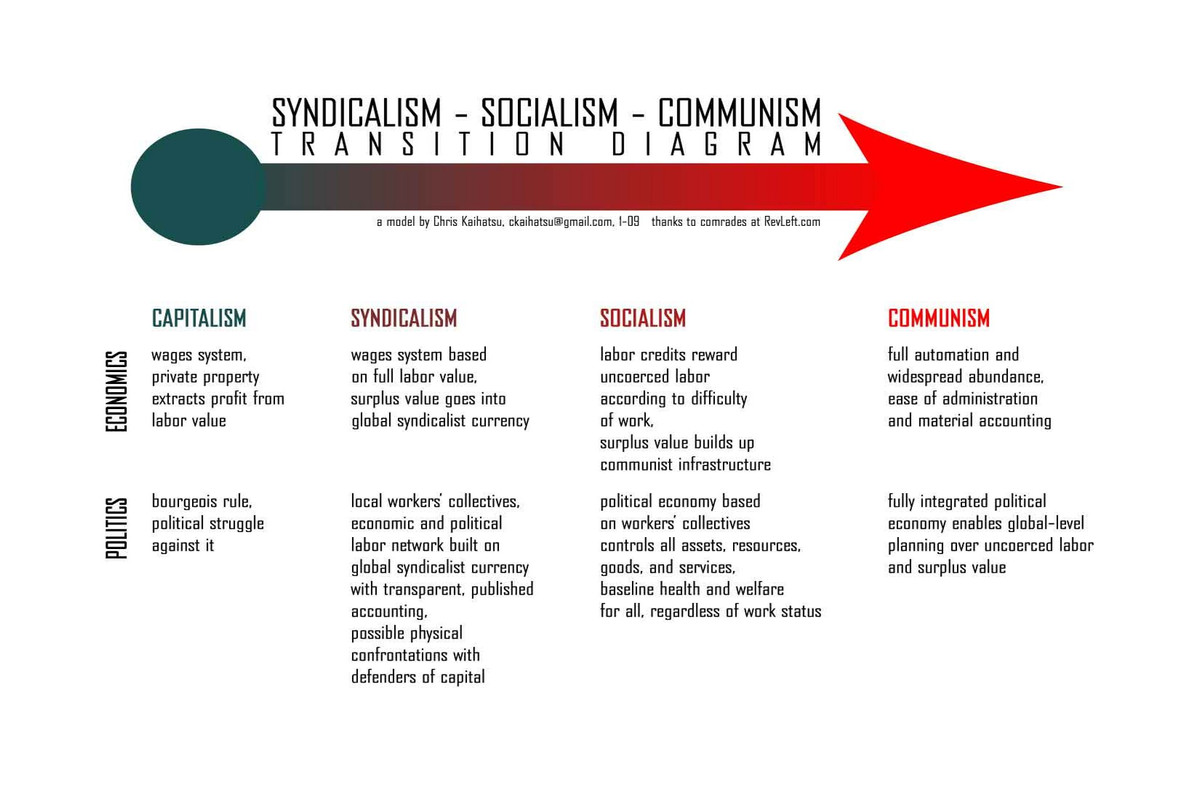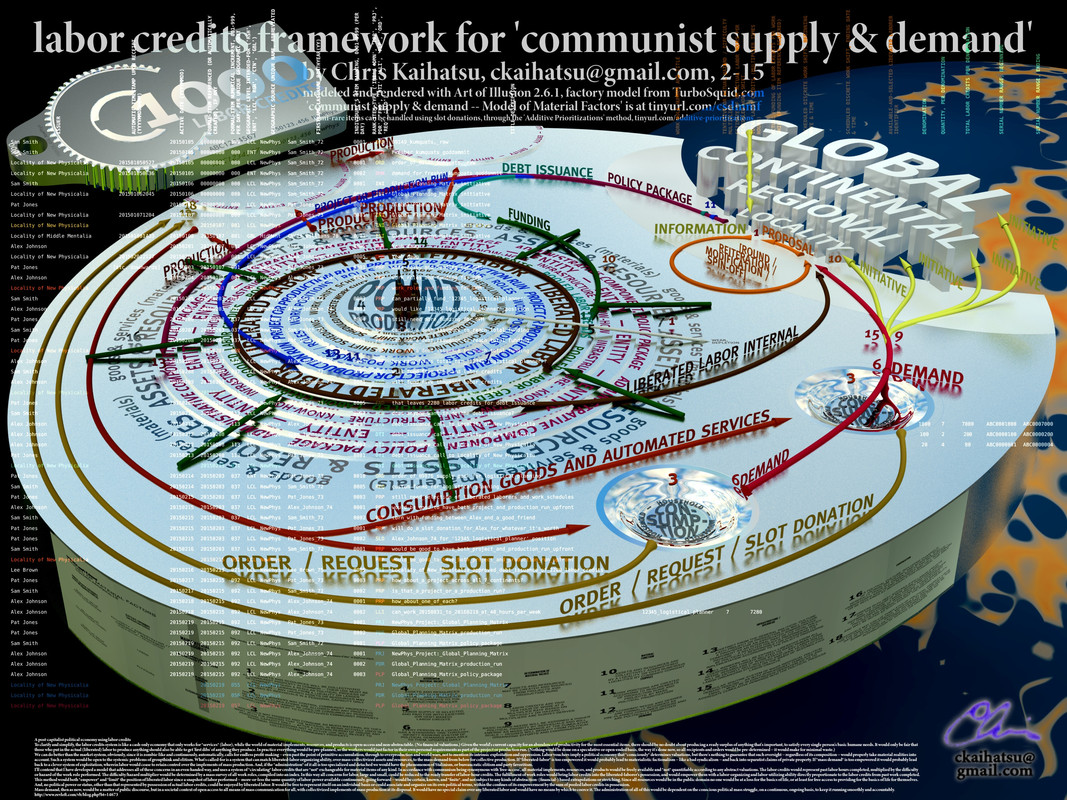ckaihatsu wrote:
Yeah, I realized I was being imprecise, so I added the 'CLARIFICATION' post.
Here's more from that Wikipedia entry about 'financialization':
Again, the financial sector is *non-productive* -- it does not produce any commodities.
wat0n wrote:
Is that why Marxists want to nationalize the financial sector? Because it produces nothing? 
Well, more than 'nationalize', really -- you're thinking of Sanders-type socialism.
Finance can be *eliminated*, because it's non-productive (is all just *overhead*, producing zero commodities). A world of workers in collective control of social production would *not need* finance since all decisions would be based on *use values*, with no need for exchange values whatsoever.
---
ckaihatsu wrote:
You're not being clear -- do you mean the Declining Rate of Profit data that I shared previously -- ?

https://thenextrecession.wordpress.com/ ... d-piketty/
wat0n wrote:
I'm referring to stock market returns. Buybacks are a red herring, designed to distract from the issue at hand: If the profit rate is falling, why hasn't it shown in stock market returns for the last century?
You already *mentioned* this -- the stock market does *not* necessarily reflect real *growth* (GDP growth). It can run on a Ponzi-scheme-type of accumulation, or a tulip-bulbs-type speculative bubble, or from government funding.
---
wat0n wrote:
Of course they [innovations] won't be adapted immediately. But they will, eventually, if they are invented and profitable.
ckaihatsu wrote:
Well, again, that's not *automatic* -- look at the Great Depression, for example, when consumer buying power was *sharply* reduced. (Etc.)
wat0n wrote:
That was simply cyclical variation - a particularly bad one, indeed, as a result of many factors (including of the regulatory kind), but it's still not a trend.
It's a trend *against* technological innovation. (And did you *really* just make a supply-side argument here just now?) (grin)
---
ckaihatsu wrote:
Well, I can't *stop* you from doing it -- I provided sample data for it, and there's always Wikipedia as well....
---
ckaihatsu wrote:
Regarding the measurement used for 'profit', I just remembered that such is implied / included in my 'Labor & Capital' diagram that I posted last time. Here it is again:
[11] Labor & Capital, Wages & Dividends
wat0n wrote:
No, I want a clear definition from your own formulae.
For instance, one definition of profits I would use:
Profits = p*f(K,L)-wL-rK
Where p = the good's price; f(K,L) = the production function (in terms of labor and capital); L = labor; K = capital; w = real wage a.k.a. the price of labor; r = real interest rate, a.k.a. the price of capital.
You're not realizing that I have *no interest* in doing this -- to a Marxist 'profits' is the employer's legal *stealing* of surplus labor value, so there's no point in being mathematically precise about it. It's a *political* thing.
---
ckaihatsu wrote:
You *could* address the empirical data, in the graph, that I've now provided *twice*.
wat0n wrote:
I already did
No, you're talking about the *theory*, in general. I provided specific empirical *data*, in a graph, that you're sidestepping.
wat0n wrote:
by quoting the following:
Various efforts have been conducted since the 1970s to empirically examine the TRPF. Studies supporting or arguing in favour of it include those by Michael Roberts,[75][76] Minqi Li,[77] John Bradford,[78] and Deenpankar Basu (2012).[79] Studies critical or contradicting the TRPF include those by Themistoklis Kalogerakos,[80] Marcelo Resende,[81] Òscar Jordà[82] and Simcha Barkai.[83] Other studies, such as those by Basu (2013),[84] Elveren[85] Thomas Weiß[86] and Ivan Trofimov,[87] report mixed results or argue that the answer is not yet certain due to conflicting findings and issues with appropriately measuring the TRPF.
The empirical evidence is far from clear, differences arise because the rate of profit is not necessarily easy to define. Hence why I'm asking you to state your definition. First a conceptual one, but we will sooner or later turn into the operative definitions used to calculate the data in that plot.
I'll pass -- now what do you think about that world declining rate of profit as shown in the graph?
---
ckaihatsu wrote:
Well, look at Lebanon, for a recent example -- it suffered *hyperinflation* due to U.S. sanctions on its economics, so creditors weren't willing to lend it money to bolster its currency, and it turned to the IMF.
What good is its *stock market* when the 'real economy' itself was no longer functioning in any meaningful way?
wat0n wrote:
Lebanon has had high inflation, but is not suffering from hyperinflation (at least for now). Now, Venezuela on the other hand...
Either way, this doesn't have all that much to do with the stock market.
Exactly. Now you're getting it.
---
ckaihatsu wrote:
You're *still* thinking conventionally and in a *state*-based way. Again, there's *no* standing government, or government / state of any kind. There are no financial institutions, or businesses, or companies, because there's *no need* for such in communism. No exchange values / finance / money / currency / exchanges.
Centralization would *only* happen over productive means in common (factories / workplaces), by combined consent of the respective active liberated laborers, per-item, for generalization over any given item, like face masks.
Here's a sample scenario -- let's say that face masks are being produced by liberated laborers in the factories roughly in the vicinity of Locality 'A'. It just so happens that liberated laborers near Locality 'B' are *also* making face masks at several factories around *their* area. Journalists around that industry are publishing a blog, and they pick up on what's happening with the Locality B area and that area's production of face masks. The active face-mask liberated-workers around Locality A read the industry press and they come across a series of articles on the face-mask industry around Locality B, and some of them decide as a group to take the initiative to reach out to Locality-B-area face-mask liberated laborers, and they suggest that, given the numbers reported, the face mask factories of *both* areas could see an increase in productivity by as much as 28% if they combine their respective supply chains to feed into *both* geographic areas, for face masks, realizing economies-of-scale as a result. (Factories near Locality A could concentrate just on the elastic string, while factories near Locality B could focus on just producing the fabric material, with final assembly at both locations, making the process more materially efficient, and faster.)
wat0n wrote:
I see. But what you are saying would (among other things) require a constant effort for transparency, publishing production statistics of all kinds, etc. Am I correct?
Yes, exactly -- there would be no private interests any more, so there would be no private interests in *information*. (Etc.) (There would also be no standing centralized *state*.)
---
ckaihatsu wrote:
There *can't* be any such 'stealing' because no one *owns* anything, not even the machinery / factories, or the products of them. No one receives anything directly in exchange for their efforts to produce for the common good, so no one can get 'paid' more or less than anyone else, in a strictly 'pure' (*zero*-labor-credits) communist gift economy.
I introduce the vehicle of labor credits into the baseline communist gift economy so as to cover the possibility that *no one* would want to do certain labor roles that are socially necessary but are too hazardous / difficult / distasteful. (I've previously used the example of manually cleaning out clogged sewers in a municipal sewer system, like that in Mexico City.)
To sum up, people *could* simply take whatever they want, whenever they want, without money, and they wouldn't have to resort to using force, because everything produced post-capitalism would be *free-access* and *directly distributed*. Worst case would be that factories would keep a certain *surplus* -- maybe 20% -- of whatever it is that they produce, on-hand, according to the liberated-workers there, for any such 'walk-ups' (which would be outside of the formal daily individual self-ranked 'demands' lists, for mass-aggregation). Over time and experience this percentage could be tailored to each particular workplace. (In alignment with the overall description of 'a landscape of piles of stuff'.)
wat0n wrote:
They would only be introduced as a form of compensatory earnings? If so, why would anyone work (generally)? After all, I can get free stuff and simply "work" as a hobby.
No, no direct rewards-for-labor / 'compensatory earnings', because everyone always has full access to 'the commons', meaning whatever anyone else produces for the common good, for their own *personal* consumption (no private accumulations). Sure, people could just get free stuff and simply "work" as a hobby -- this is the society of 'rock stars' that I mentioned earlier. *Or*, this population of 'rock stars' might realize that everyone's been spending too much time and electricity *on stage*, and that food supplies are getting critically low, so maybe *some*, at least, should shift their attentions and efforts to saving-the-world, with food production, and possibly fully-automated, so that they can get back to being rock stars.
Also recall this list:
ckaihatsu wrote:
Craft. Social consciousness. Wanting to see the end product. Experimentation. Wanting to provide for others. Escaping boredom. Pushing the envelope. Personal goals. Wanting to be self-sufficient. Social networking. Mixing work with pleasure. Being productive. Being creative. Access to social leadership. Wanting to be a part of collective self-determination. Stewardship over the earth's resources. Wanting consumption of a very specific kind of product. Hobbyism.
viewtopic.php?p=15088612#p15088612
---
ckaihatsu wrote:
Labor credits would be allocated to *proposals* and *projects*, per plan, and such plans / proposals / projects would *compete*, and would be open to inclusion on individuals' daily self-ranked 'demands' lists (as socio-political 'demands', either abstractly, or specificly, by plan).
Perhaps one active proposal would allocate more labor credits to 'elastic string makers', while another active proposal in circulation would allocate more labor credits to 'face mask material makers'. In both cases the 'funding' of labor credits would necessarily have to come from liberated laborers who *have* such potential funding, in part, *in hand*, necessarily from their *own* past liberated-labor efforts.
*Localities* could also issue their own *debt-based* labor credits, if necesssary, per proposal, but it would be public knowledge that such labor credits (by serial number, and batch) are *debt-based*, until enough people from that locality then go out and do work elsewhere to bring back sufficient amounts of labor credits to *neutralize* the debt that they issued as a locality. That information would be public knowledge as well, and the labor credits themselves would continue to circulate, regardless. (Think of the labor credits as 'IOUs', for actual liberated-labor done, that are debt-based until covered / neutralized by labor credits earned and brought-back to that locality that issued the debt-based labor credits, to cancel the debt. All labor credits *always* continue to circulate, regardless.)
communist supply & demand -- Model of Material Factors
https://www.revleft.space/vb/threads/20 ... ost2889338
wat0n wrote:
Who would allocate labor credits? That is, who would decide how many credits would each community get?
It's not state planning -- I described how labor credits would come into existence, and how they would be valuated and function as an integral part of social planning.
If there was a widespread social consciousness for needing a *brand-new* factory for making face masks, to make more face masks, that would be reflected in high 'face mask' positioning (top-ten) on people's daily individual 'demands' ranking lists, for that locality, or across *many* localities.
Someone might come up with a 'Plan A' for such, saying that 'x' number of liberated-labor work hours would be needed for work role 'a', with an 'a-sub-m' *multiplier* for that 'a' work role, and a 'b' work role, with 'b-sub-m' *multiplier* of labor credits per hour for that 'b' work role, etc. Someone else might come up with a 'Plan B', someone else with a 'Plan C', and so on -- these plans / proposals / projects / policy packages would all be *competing* for attention and high daily rankings by individuals. (See the 'communist supply & demand' model, above.)
Each plan would have to actually *round-up* the numbers of labor credits specified in the plan, from among those who have them (necessarily from their own past labor efforts) -- this equates to pledged *economic support* from past active liberated-laborers, who *want* to economically support 'Plan A', or 'Plan B', or 'Plan C', etc., or even some *combination* of them, apportioning labor credits as they like, since it's *their* labor credits to apportion. (Labor credits are *never* exchanged for actual goods and services because such would be *commodity production*, and not communism. Produced goods and services would be *pre-planned* for specific and/or general consumption, according to whatever plan, as just described. See the section in the labor credits FAQ about checks-and-balances.)
---
ckaihatsu wrote:
It depends on the *scale* on the endeavor. Work roles could be for the common good, in concert with others, as on industrial machinery of mass production.
*Or* efforts could be at *any other* scale, conceivably, even person-to-person, as with handicrafts. Which work roles would be considered to be a *social priority*, for *socially necessary* production, would be a socio-political thing.
I've entertained the thought-experiment of 'a post-capitalist society of rock stars', meaning that maybe, post-capitalism, everyone would just want to work on their own music, and on performing -- many socially necessary work roles, like food production, would go untendered in that case, and society would have to adjust somehow, perhaps by *automating* all food production so that everyone could get back to playing guitar, or whatever.
wat0n wrote:
Honestly, it sounds a bit like wishful thinking. After all, who would produce those capital goods? Who would work in their maintenance? Seems like a boring job, so I am not sure if enough people would be willing to do that as a hobby.
There *are no* 'capital goods', because there is *no* capital / exchange values / finance / money / currency / exchanges.
Instead of relying on the market allocation of finance, all production / social production would be done on a *planning* basis, according to pre-planned proposals / projects / policy packages, that *compete* with each other if they all pertain to the same goals, and cover the same production goods (means of mass industrial production), and resources / infrastructure.
No finance means no having to *look-after* finance, as you're noting -- existing productive assets like factories would have to be *scheduled* for use, anyway, so various competing plans could compete to *schedule* their particular production needs, for any given factory, or equipment, for any given calendar time.
---
ckaihatsu wrote:
Well, you're taking this rather *morally*, in a *moralistic* way, which is your prerogative, of course, but in the *socio-political* context, it realistically means that everyone in such a society would have to collectively set their own 'standards', or social norms.
wat0n wrote:
Well, you introduced that concept of "taking responsibility for your failures" into this discussion, didn't you?
You're *still* speaking abstractly, without a context -- do you mean this *philosophically*, or within *capitalism*, or for the context of my 'labor credits' model framework?
If it's within my communist-gift-economy-based 'labor credits' model, then here's the section that speaks to this issue of 'responsibility', or *accountability*, for any given selected policy package:
Infrastructure / overhead
communist administration -- Distinct from the general political culture each project or production run will include a provision for an associated administrative component as an integral part of its total policy package -- a selected policy's proponents will be politically responsible for overseeing its implementation according to the policy's provisions
https://www.revleft.space/vb/threads/20 ... -Questions
---
ckaihatsu wrote:
The USSR was a real example of *Stalinism*. No one before Stalin came to power *wanted* Stalin to come to power -- it was a historical *accident*, basically.
Of course I share the criticism of Stalinism in that it's *not* workers-of-the-world socialism.
wat0n wrote:
I see. Well, the thing is, the USSR was not the only country where Sovietism was implemented.
Okay, and your *point* here is *what*, exactly?
---
ckaihatsu wrote:
No, I've never been an anarchist -- it's too *localist*, but, that said, I *am* in favor of *bottom-up* organizing of social productivity, post-capitalism, as seen in this diagram of mine (also a *critique* of anarchism):
Emergent Central Planning
For the proletarian revolution I'm a *vanguardist*, and I have a treatment of that here:
wat0n wrote:
I see.
---
ckaihatsu wrote:
You're really *exaggerating* violent civilian crime, as though such *needs* policing, when crime rates are at historic *lows* -- again, the greater societal threat right now comes from *killer cops*, moreso than *killer civilians*, especially since the killer cops are state-sanctioned and mostly are not treated as criminals, unfortunately.
This is where *deterrence* is called-for, because in *any other* situation there would be changes made to *deter* such overreactions on the part of professionals.
wat0n wrote:
Crime is at historic lows indeed, and yet police killings still represent a minor part of all crime. Of course it's important to consider whatever effects would abolishing the police have. Crime rates are low but not zero.
This is basically a *civil rights* issue -- if some school was physically preventing students from attending, then there would have to be a *greater authority* to intervene, to uphold those students' *civil rights* to attend school.
https://en.wikipedia.org/wiki/Little_Rock_NineLikewise, if some various police departments are a standing, *legal* threat to people's safety, there should be a *federal* treatment for this problem so that a *uniform* policy of getting killer cops off the streets, by defunding all police departments, can be put into place.
---
ckaihatsu wrote:
No, I can't agree, because my political perspective is that government is a *plutocracy* and primarily -- almost *exclusively* -- serves the interests of the wealthy. I think a particular anarchist saying is appropriate here:
The bourgeois establishment favors the *status quo* -- as you do -- or even *rolling back* social progress, as with civil rights, working conditions, gender roles, etc.
wat0n wrote:
So I'm guessing US society today must be the same as that in 1790. After all, voting doesn't change anything.
Right? 
You can use the killer cops / police brutality issue as a defining example. It's existed during *several* presidential administrations, despite the various kinds of voting that put those respective presidents in office.
---
ckaihatsu wrote:
You're failing to see that *class* is paramount, and you're too caught-up in the *procedurals* of intra-national political rituals.
[1] History, Macro Micro -- Precision
wat0n wrote:
This view of society stopped being useful quite a long time ago. Class reductionism cannot explain events such as WWI properly (why did the working classes in many countries preferred to kill each other in trench warfare rather than coordinating a Revolution? This is a question Marxists have never been able to address).
On *that* particular event, you can look into the dynamics of *false consciousness*, and *ruling class propaganda* / mass media.
'Class reductionism' is better described as 'class'. (See the diagram for a sorting of societal constants / components according to relative *scale*, yielding *class* as paramount in determinism.)
On your *historical* political question I've used the following treatment in the past:
The popularity of the war was not necessarily as deeply engrained among the mass of people as the enthusiastic demonstrations and singing of patriotic songs suggested. Historian David Blackbourn writes of Germany, ‘The patriotic demonstrations of late July involved relatively small groups, with students and young salesmen prominent. Working class areas like the Ruhr were quiet… Older observers noted a contrast with the enthusiasm of 1870’.41 Shlyapnikov, a revolutionary worker in St Petersburg, contrasted the enthusiasm for the war among the middle and upper classes with the more subdued mood in the factories:
The St Petersburg press did much to kindle popular chauvinism. They skilfully blew up ‘German’ atrocities against Russian women and old men remaining in Germany. But even this hostile atmosphere did not drive workers to an excess of nationalism.42
Ralph Fox told how, as a young worker in London, it was possible to organise weekly anti-war meetings in Finsbury Park.43
Trotsky explained the mood more as a reaction to people’s normal humdrum lives than any deep-seated nationalism:
The people whose lives, day in day out, pass in the monotony of hopelessness are many; they are the mainstay of modern society. The alarm of mobilisation breaks into their lives like a promise; the familiar and long-hated is overthrown, and the new and unusual reigns in its place. Changes still more incredible are in store for them in the future. For better or worse? For better, of course—what can seem worse than ‘normal’ conditions?… War affects everybody, and those who are oppressed and deceived by life consequently feel that they are on an equal footing with the rich and powerful.44
Different social classes are never fully segregated from one another. The mood of those at the top influences those just below them, and the mood of those in the middle influences those at the bottom. The determination of Europe’s ruling classes to go to war with one another was transmitted in a thousand ways to the middle classes and sections of the working class—through patriotic speeches and newspaper stories about ‘enemy atrocities’, through marching bands and popular songs, and through declarations by novelists, poets and philosophers. The German historian Meinecke described the outbreak of the war as filling him with ‘the profoundest joy’. The radical French novelist Anatole France recalled (with a sense of shame) making ‘little speeches to the soldiers’. The philosopher Bergson described the war as one of ‘civilisation against barbarism’. The English poet Rupert Brooke wrote that ‘nobleness walks in our ways again’,45 and the novelist H G Wells enthused about a ‘war to end war’. Schoolteachers repeated such statements to adolescent boys, urging them to go off and fight. Anyone who dissented was guilty of ‘stabbing our boys in the back’.
There were still wide groups of workers who could be expected to resist such pressures. Socialist movements and groups of trade union militants were accustomed to lies in the press and attacks on their principles. Many had flocked to rallies of thousands in London, Paris and Berlin on the eve of the war to hear their leaders call for peace. But once war broke out, those same leaders rushed to support it. The German and Austrian Social Democrats, the British Labour Party and TUC, the French Socialist Guesde and the syndicalist Jouhaux, the veteran Russian Marxist Plekhanov and the veteran Russian anarchist Kropotkin—all were united in their willingness to back their rulers against others. Those who had doubts—for instance, Kautsky and Haase in Germany, and Keir Hardie in Britain—kept quiet in order to preserve ‘party unity’ and to avoid being accused of betraying ‘the nation’. ‘A nation at war must be united,’ wrote Hardie. ‘The boys who have gone forth to fight their country’s battles must not be disheartened by any discordant note at home’.46
Decades of abiding by the rules of capitalist democracy were having their effect. Pursuit of reform within the structures of the capitalist state led to identification with that state in its military conflicts. In the warring countries only the Serbian Socialists and the Russian Bolsheviks came out in unremitting hostility to the war. The Italian Socialists also opposed the war when Italy finally allied itself with Britain, France and Russia. But their attitude owed much to a split within the Italian ruing class over which side to support—and the left wing editor of the party’s daily paper, a certain Benito Mussolini, split away to wage virulently pro-war agitation.
The belief in a quick victory proved completely misplaced. In the first months of the war the German army did manage to race through Belgium and northern France to within 50 miles of Paris, and the Russian army advanced far into German East Prussia. But both were then forced back. The Germans retreated before the French and British armies at the Battle of the Marne to form a defensive line of trenches some 30 miles back. The Russians suffered heavy losses at the Battle of Tannenberg and were driven from German territory. The ‘war of manoeuvre’ (of quick-moving armies) became a war of attrition, with each side suffering enormous losses as it attempted to break through the strongly entrenched positions of the other side. The expected four months of hostilities turned into more than four years, and spread from the eastern and western fronts to Turkey, Mesopotamia, the Italian-Austrian border and northern Greece.
Harman, _People's History of the World_, pp. 405-408
---
wat0n wrote:
I would say "stagnation" is only a partial description of what has been going on in capitalist economies. It depends on what has stagnated and where.
The USSR did indeed suffer from stagnation in many dimensions, including how its Government worked and its societal progress. But it also suffered from economic stagnation from the 1970s onwards, indeed, its Government's stagnation was one of the causes of the general economic stagnation of the time.
ckaihatsu wrote:
Okay, I won't simply *ignore* this point, as you do for so many of the points *I* make -- here's the proof:
The value of all consumer goods manufactured in 1972 in retail prices was about 118 billion rubles ($530 billion).[54] The Era of Stagnation in the mid-1970s was triggered by the Nixon Shock and aggravated by the war in Afghanistan in 1979 and led to a period of economic standstill between 1979 and 1985. Soviet military buildup at the expense of domestic development kept the Soviet Union's GDP at the same level during the first half of the 1980s.[55] The Soviet planned economy was not structured to respond adequately to the demands of the complex modern economy it had helped to forge. The massive quantities of goods produced often did not meet the needs or tastes of consumers.[56]
The volume of decisions facing planners in Moscow became overwhelming. The cumbersome procedures for bureaucratic administration foreclosed the free communication and flexible response required at the enterprise level for dealing with worker alienation, innovation, customers, and suppliers. During 1975–1985, corruption and data fiddling became common practice among bureaucracy to report satisfied targets and quotas thus entrenching the crisis. At the same time, the effects of the central planning were progressively distorted due to the rapid growth of the second economy in the Soviet Union.[24]
https://en.wikipedia.org/wiki/Economy_o ... %80%931990
wat0n wrote:
This is not in disagreement with what I said.
---
ckaihatsu wrote:
I'm not predicting *shit* -- such would be *presumptuous* on my part. What I *have* done is to put forward a comprehensive communist-gift-economy-based *model framework*, which has its own internal logic and functioning.
Your position, though, is based on analyzing historical *Stalinism*, and I'm certainly not for such bureaucratic-elitism. I'm for workers-of-the-world *socialism*.
wat0n wrote:
No, your proposal has your predicted internal logic and functioning. You don't know for sure if that's how would things pan out.
Of course I don't -- I'm not Crystal-Ball-History-Determiner-Guy, and neither are you.
---
ckaihatsu wrote:
And the data comes from *police reports*, I'd estimate.
wat0n wrote:
Not necessarily. They can also come from other sources, such as eyewitness testimony and court cases.
Okay.
---
ckaihatsu wrote:
Don't you think that even *one* death at the hands of the police, by overreaction, is one death too many -- ?
wat0n wrote:
Sure...
---
ckaihatsu wrote:
The government has the means to *shut that shit down*.
wat0n wrote:
...But even a single death at the hands of a common criminal is also one too many, and that justifies the very existence of the police.
No, I think the priority is for the *government* to not be killing people in the name of the people. It would set a good example.
---
ckaihatsu wrote:
Because the life of a person taken by a cop is a life that could have been *saved*.
wat0n wrote:
And the life taken by a criminal couldn't? Should people be armed 24/7 to deter people from killing them?
That's of a *secondary* concern, when the *primary* concern is to stop *state-sanctioned* killings by its own cops, and paid for with public funds.
---
ckaihatsu wrote:
Why are you so stubborn against getting cops off the streets so that there *are no* cops to commit killings? Human lives are more important than *property*.
wat0n wrote:
Since when did I say cops exclusively protect property? Pretty disingenuous implication here.
Again, you have to examine your political *priorities* -- what good is policing if the police *themselves* are committing gratuitous killings in the name of 'preventing' crime? That's downright *Orwellian*.
---
ckaihatsu wrote:
I'm open to any observations you may have as to why *civilians* kill other people.
wat0n wrote:
I can think of many reasons, actually.
---
ckaihatsu wrote:
But don't you see that you're *not suggesting* any realistic way to *address* this 'serious problem' -- ? At most, over dozens and dozens of posts, you might *acknowledge* that this is a 'serious problem', and then you go back to your main political line of defending the status quo. Your words ('serious problem') have *no weight* to them, whatsoever.
Look at all the state resources that are dedicated to chasing 'bad guys', internationally, with full military spending and shitloads of killing gear. Maybe the 'bad guys' are *here*, on the streets, in blue uniforms. Shouldn't we send the military in after *them*?
wat0n wrote:
I already provided proposals that would help deal with unjustified police killings. It ironically happens to be what BLM was demanding back in 2015.
What I don't understand is why would one simply not care at all if, for every police killing that is prevented, one or more civilian-on-civilian killings are committed.
Ultimately it's the private-interest *competition* that has to be outmoded, because *that's* what's at the heart of 'crime', as in the drug trade, or international bourgeois warfare, for that matter. The world is overripe for workers-of-the-world socialism, overthrowing capitalism.
---
ckaihatsu wrote:
Whatever -- you're splitting hairs again, since business is obviously *suckling on the government teat*, regarding the difficult-and-expensive 'basic research'.
wat0n wrote:
What makes you believe basic research is necessarily more expensive than applied research and development?
That's beside the point -- you don't want to acknowledge that, when it comes to innovation / technological development, the U.S. is as Stalinist / crony-capitalist as any international rival.
---
ckaihatsu wrote:
I don't see the '60%' figure anywhere in the text you've excerpted here.
wat0n wrote:
That's because the number is in Figure 4-4.
No, it's not.
---
ckaihatsu wrote:
So you're *admitting* that the government does the expensive, difficult R&D, at public expense, for the sake of private-sector profit-making.
wat0n wrote:
But most research is not basic science, and it isn't necessarily easy either.
ckaihatsu wrote:
You're not *addressing* what I've said -- you're going off on a tangent, and talking about something else, the private sector.
wat0n wrote:
I think I did: Sure, basic research is not directly profitable and hence the private sector will tend to do less of it than ideal. But basic research does not represent most R&D activity, at all.
So, to summarize, basic research is not directly profitable so such is paid-for and administered by the U.S. government, using public funds, so that the private sector can *make profits* from such publicly funded R&D.
---
ckaihatsu wrote:
To *summarize*, I'd call the U.S. system of R&D to be a *bourgeois technocracy*, since government R&D is funded by bureaucratic planning, and done by academia, to directly benefit companies' profits.
(In other words it's *not* free-market competition among self-funded companies, competing over market share, because none of them would even *exist* if they had to do *their own* basic research, in market-redundant ways, instead of getting that for *free* from the government, meaning *public funds*.)
wat0n wrote:
Sure, and the Government also gets a return for that.
---
ckaihatsu wrote:
Again you're showing that you don't understand the cause-and-effect here -- the *cause* of protests and riots is the government toleration of killer cops. If you're so 'annoyed' by protests and riots then *get rid of* the killings at the hands of cops. You've been provided with policy *alternatives* for enacting this.
It's akin to my saying that you can prevent headaches if you don't hit your head against the wall.
wat0n wrote:
No, you won't have protests or riots over police killings.
ckaihatsu wrote:
Um, have you seen the *topic of this thread* -- ?
What do you think the 'violent protests in Portland' are *about* -- ?
wat0n wrote:
About their pet topic for the day. But actually I don't think police killings are the only reason for the protests.
Yes, they are -- the protests and riots are about killer cops, or killings by police.
---
ckaihatsu wrote:
*Or*, the *new* asshole gets into power and the *issues* remain unaddressed, so the protestors / rioters have cause to do the same thing that they're doing *now*.
wat0n wrote:
Or even if the issue of police killings was addressed, they will find some other issue to justify rioting.
I have one: the *military* killings abroad, as in Afghanistan, Iraq, Libya, and Syria.
---
ckaihatsu wrote:
I could just as easily say that issues like defunding the police are better dealt by the Federal Government, as are festering issues like COVID-19, unemployment, hazardous workplace conditions due to COVID-19, rent, etc.
wat0n wrote:
States can and do deal with all those issues. Of course, the Federal Government can participate too, at least in terms of providing funding.
That's what this is all about -- that the federal government should be able to address *domestic* issues, with funding.
---
ckaihatsu wrote:
You're more interested in legalistic aspects of government *procedure* than with the unaddressed social *issues* themselves.
wat0n wrote:
That happens to be important in practice, so yes, I do care about procedure.
Well, that's *internal* to the bourgeois government bureaucracy -- what *people* care about is the *results*, so however you do it *internally* needs to produce the correct, desired *results*.
---
ckaihatsu wrote:
You're being *evasive* because the governmental *hierarchy* *could* undertake a *broad-based push* to stop killer cops, and their racist killings, if it wanted to.
wat0n wrote:
There are limits to that under the US Constitution.
What the Federal Government can do is set minimum standards and deny funding to States and localities who don't comply. But policing, ultimately, is a local affair.
ckaihatsu wrote:
You're saying the *wrong* thing -- protestors don't need to hear the run-around.
wat0n wrote:
Indeed, in fact they don't care about that. Again, deal with policing and they will find some other issue to justify protests. I can imagine rent being one.
Rent is a good one, since rent is real, as well. If the country winds up being in the same situation in January as it's in now, what do you think the government should do about rent, at *that* point?
Also, the government *isn't* dealing with policing, meaning killer cops.
---
ckaihatsu wrote:
Abolishing the police means that we can save 1000+ lives each and every year. That's worth it.
wat0n wrote:
No, you don't know that. You don't know how many lives would be lost as a result of increased crime resulting from having no police around.
But I *do* know what's going on *now*, and 1000+ deaths domestically as a result of 'collateral damage' is *not* acceptable.
---
ckaihatsu wrote:
Yes, you did -- you call it 'crime' and you specifically cited 'home invasions' and 'vehicle thefts', by my recollection.
wat0n wrote:
Those are examples, not an exhaustive list of crimes. I could have mentioned rape and murder too.
---
ckaihatsu wrote:
No, I never *called for* vigilantism. You're *assuming* that all hell will break loose if the police are disbanded, which is your *own* preferred nightmarish vision.
wat0n wrote:
And yet that's what happened during these riots as police was overloaded. A couple of examples:
You're making my point *for* me -- this is all about 'turf', or private-interests over land and materials. In this case it's just smaller-scale.
---
ckaihatsu wrote:
Duh. If workers-of-the-world socialism was historically successful then we'd be living in it *today*.
wat0n wrote:
Exactly, so what can you infer from that? Why would I believe you now?
You take yourself too seriously -- I'm not *asking* you to 'believe' me. I'm not *selling* you anything. I'm saying that historical Stalinism is *not* workers-of-the-world socialism.
---
ckaihatsu wrote:
Why don't you first personally undertake to make sure that all police departments *are* shut down, and then I'll enjoy the vigilantes, okay -- ?
wat0n wrote:
No, I don't want vigilantes so I'll pass.
Okay, so how are you going to address getting killer cops off the streets, as in shutting down *all* police departments, so as to prevent 1000+ killings per year.
---
ckaihatsu wrote:
Well, you're just being *pessimistic*, to imagine that proletarian revolution will automatically fatalistically devolve into capitalist-type clientelism, or patronage.
wat0n wrote:
I'm simply pointing out that clientelism/patronage isn't about ideology. Of course socialism can devolve into that... Why not?
Patronage / clientelism derives from *private property relations*, because everything that's useful is *commodified* / privatized, under capitalism, with patronage-type social relations being one possibility.
The key word is 'devolve' -- sure, if international militaristic pressure is pressed *against* a post-capitalist-type of new political economy, as against the soviets and the Bolshevik Revolution, then socialist-type social relations *can't* be sustained, and such will *devolve*, as we saw historically, into Stalinism / nationalist consolidation, and patronage / clientelism.
But -- as with all current government social services -- if the *funding* / economic integrity is allowed, then such collectivist-oriented directions *can* be successful, in the absence of artificial impediments from *without*.






























 - By Tainari88
- By Tainari88 - By wat0n
- By wat0n